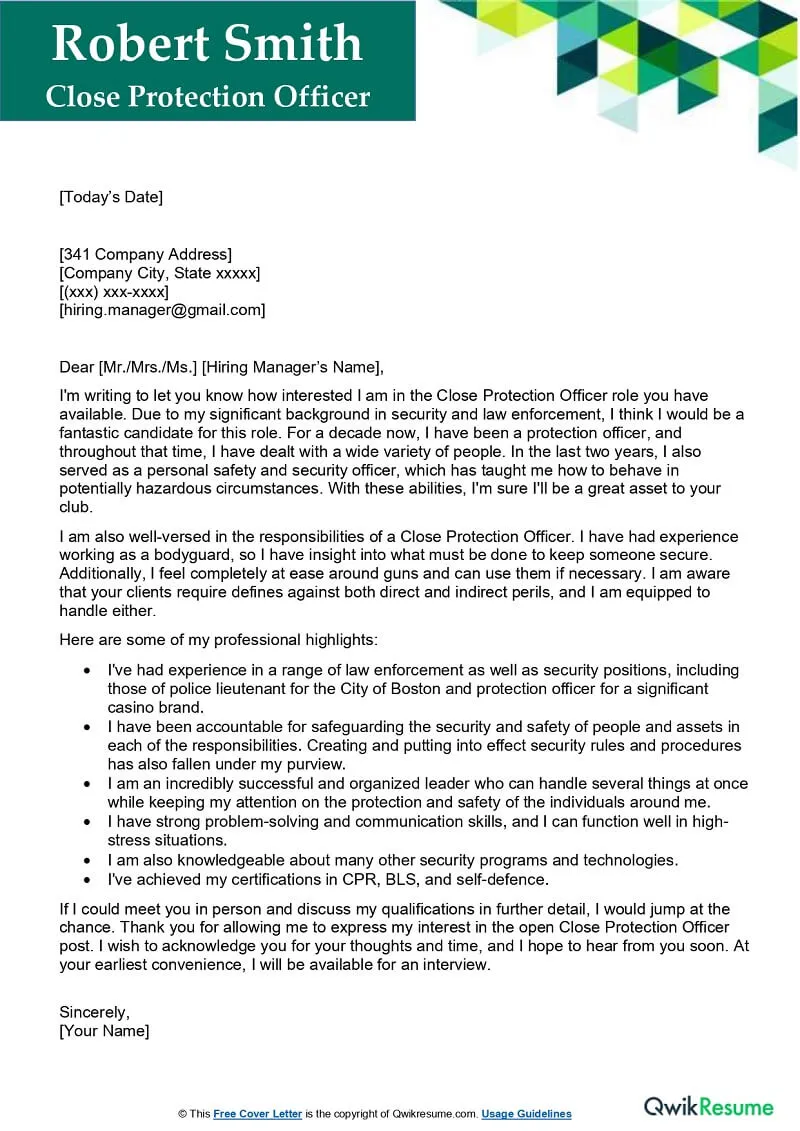Understanding the Victim Advocate Role
A victim advocate provides support and resources to individuals who have experienced trauma, abuse, or violence. This can encompass a wide range of services, from emotional support and crisis intervention to assisting with legal and medical processes. These professionals act as a crucial bridge between victims and the resources available to them, helping them navigate complex systems and access the help they need. Understanding the core duties of a victim advocate is paramount before crafting a cover letter, even without direct experience in the field, showing that you grasp the responsibilities is the first step.
Key Responsibilities of a Victim Advocate
The role of a victim advocate is multifaceted, involving a combination of direct support, resource navigation, and advocacy. They often provide emotional support, helping victims process their experiences and cope with the aftermath of trauma. This includes offering a safe space for victims to share their stories, active listening, and validating their feelings. Advocates also assist with practical matters, such as informing victims about their rights, connecting them with legal and medical professionals, and helping them access financial assistance and other resources. They may also accompany victims to court, hospitals, or other appointments, providing a sense of security and support. It is critical to demonstrate understanding of this in your cover letter.
Further key responsibilities include crisis intervention, safety planning, and advocacy. Advocates must be prepared to respond to crisis situations, providing immediate support and connecting victims with emergency services when needed. They also help victims create safety plans to protect themselves from further harm. Advocacy involves speaking on behalf of victims, ensuring their voices are heard, and advocating for their rights within the legal and social systems. Many advocates also offer community education, raising awareness about victim issues and promoting prevention efforts.
Essential Skills for Victim Advocates
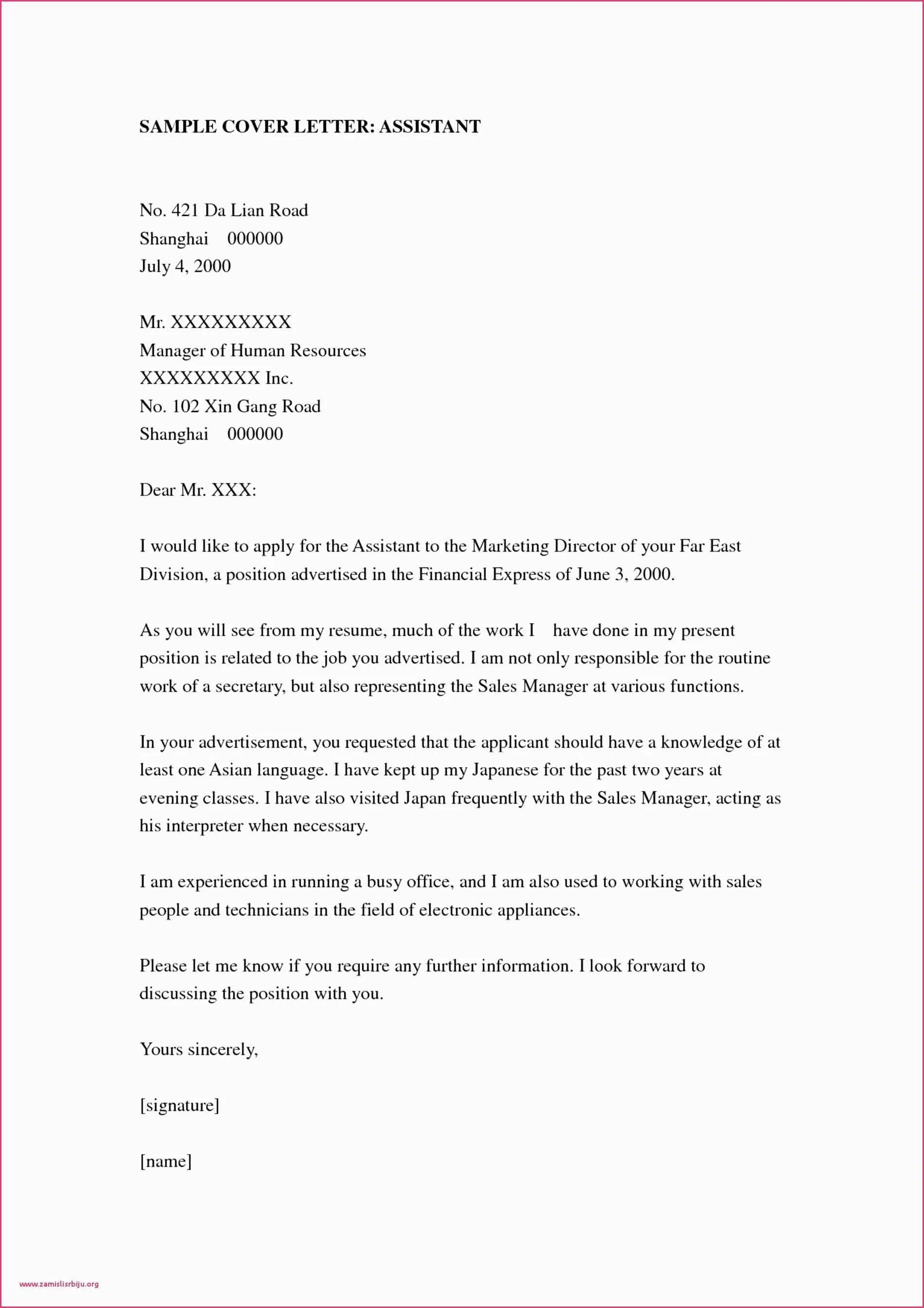
While specific skills may vary, certain qualities are consistently valued in victim advocates. Communication skills are paramount, including active listening, empathy, and the ability to communicate clearly and effectively, both verbally and in writing. Empathy is the ability to understand and share the feelings of another, crucial for building rapport and providing effective support. Problem-solving skills are also important, as advocates frequently encounter complex situations and must find practical solutions. Critical thinking enables advocates to assess situations, identify needs, and make informed decisions. Cultural sensitivity is vital, as victim advocates work with diverse populations and must be respectful of different backgrounds and experiences.
Organizational skills help advocates manage their workload, keep track of cases, and maintain accurate records. Patience and resilience are essential because the work can be emotionally challenging, and advocates must be able to remain calm and supportive under pressure. Finally, a strong ethical compass is a must; advocates must uphold confidentiality, respect boundaries, and act with integrity in all interactions. Highlight these in your cover letter.
Highlighting Transferable Skills
Even without direct experience as a victim advocate, you likely possess transferable skills that are highly valuable in this field. These are skills gained through previous jobs, volunteer work, education, or personal experiences that can be applied to the new role. Identifying and showcasing these skills is crucial for demonstrating your potential and making your application stand out. Don’t underestimate the power of these skills, as they can offset any lack of direct experience.
Identifying Relevant Skills from Other Experiences
Begin by identifying skills you’ve developed in other contexts. For example, if you’ve worked in customer service, you’ve likely honed your communication, problem-solving, and conflict-resolution skills—all valuable in victim advocacy. If you’ve been involved in leadership roles, you may have experience with decision-making, organization, and advocacy. If you’ve taken courses in psychology, social work, or related fields, highlight any coursework that emphasized empathy, active listening, or trauma-informed care. Even volunteer work can be a source of relevant skills. Think about the tasks you performed and the skills you used, and consider how these translate to the responsibilities of a victim advocate. Don’t be afraid to go beyond your professional life; personal experiences that demonstrate these soft skills are welcome, especially when you have no experience.
Showcasing Soft Skills in Your Cover Letter
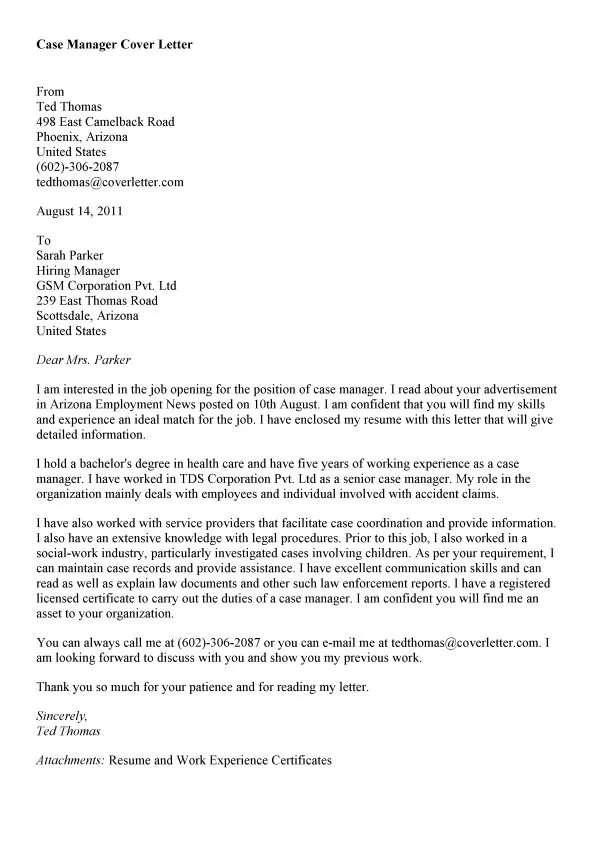
In your cover letter, give specific examples of how you’ve utilized your transferable skills. Don’t simply list skills; illustrate them through your actions and experiences. For example, instead of stating “I have strong communication skills,” write, “In my role as a [previous role], I effectively communicated with clients, resolving their issues with empathy and clarity.” When explaining your personal experiences, show the reader how you were able to utilize those skills to make a positive impact on the situation. This demonstrates your ability to apply these skills in real-world scenarios. Use action verbs to bring your experiences to life and make your letter more engaging. Some examples include: Assisting, collaborating, coordinating, counseling, mediating, negotiating, and supporting. Always tailor your language to the specific job description, matching the skills and experiences that the employer emphasizes.
Crafting a Compelling Cover Letter
A well-crafted cover letter is your opportunity to make a strong first impression and demonstrate why you’re a good fit for the role. This is where you can showcase your passion, highlight your skills, and address any concerns about your lack of experience. Your goal should be to clearly convey your interest in the position and your suitability for the role, even without direct experience. Tailor the cover letter to the specific job; this indicates your genuine interest and understanding of the organization’s mission.
Structuring Your Cover Letter Effectively
Start with a strong opening that captures the reader’s attention. Briefly introduce yourself and state the position you’re applying for. Mention where you found the job listing. The body of your letter should be divided into several paragraphs. In the first one, you can discuss your interest in victim advocacy and why you are drawn to this field. In the next section, highlight your relevant skills and experiences, using specific examples to illustrate your abilities. In the subsequent paragraph, address your lack of experience directly, emphasizing your transferable skills and willingness to learn. Conclude with a strong closing, reiterating your interest and expressing your eagerness for an interview. Always proofread and edit your cover letter carefully to eliminate errors and ensure clarity.
Emphasizing Your Passion and Empathy
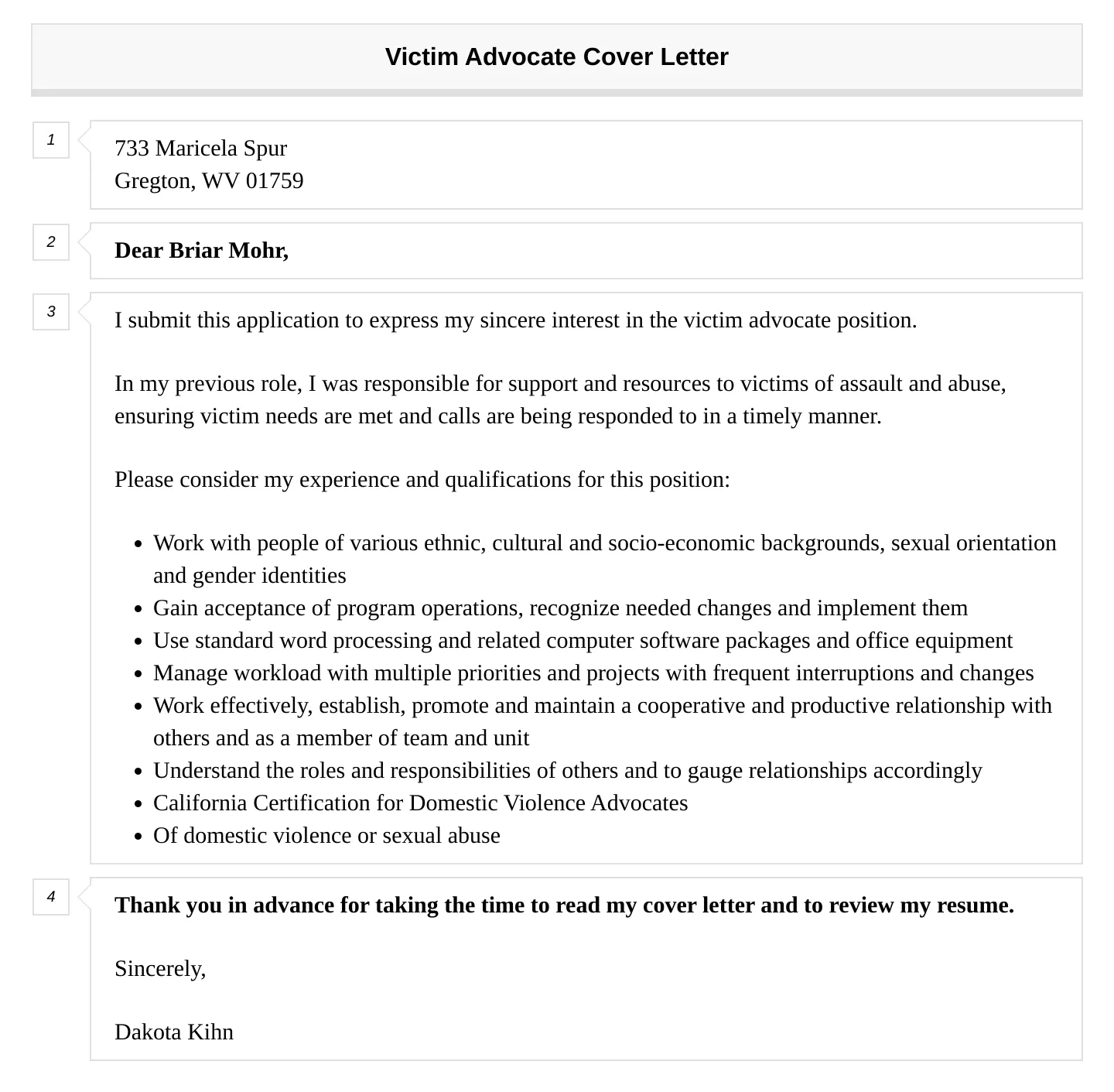
Victim advocacy is a field that requires a deep sense of empathy and a genuine desire to help others. In your cover letter, communicate your passion for this work. Share your reasons for wanting to become a victim advocate and what motivates you to support those who have experienced trauma or violence. Show your empathy by expressing your understanding of the challenges victims face. Discuss any personal experiences or motivations that led you to this career path, but keep the tone professional. Avoid overly emotional language and focus on the impact you want to make and how you can contribute to the organization’s mission. Demonstrate that you have the emotional intelligence and sensitivity needed to work with vulnerable individuals, as this is critical to securing the role.
Demonstrating Knowledge of Victim Support
Even without direct experience, you can demonstrate your knowledge of victim support by showcasing your understanding of the challenges faced by victims and the resources available to them. Research the organization you are applying to and become familiar with their mission, services, and values. Mention any training or coursework you’ve completed related to victim support, crisis intervention, or trauma-informed care. If you have experience with any volunteer work, explain the impact you had and your desire to translate that into this role. Highlight your understanding of confidentiality, ethical considerations, and the importance of providing support in a non-judgmental manner. Show that you have a grasp of the victim advocacy landscape, including relevant laws, policies, and best practices.
Tailoring Your Letter to the Specific Job
Customize your cover letter for each job application. Read the job description carefully, identifying the key skills, experiences, and qualifications the employer is seeking. Use the same keywords and phrases that are used in the job posting. Focus on the aspects of your experience and skills that align with the specific requirements. The goal is to show the employer that you understand their needs and that you are the right person for the role. Provide specific examples of how you have utilized the skills required in your previous roles or in any volunteer work. This is one of the most important aspects, as it is what gives the employer confidence that you are the best candidate for the job.
Addressing the Lack of Experience Directly
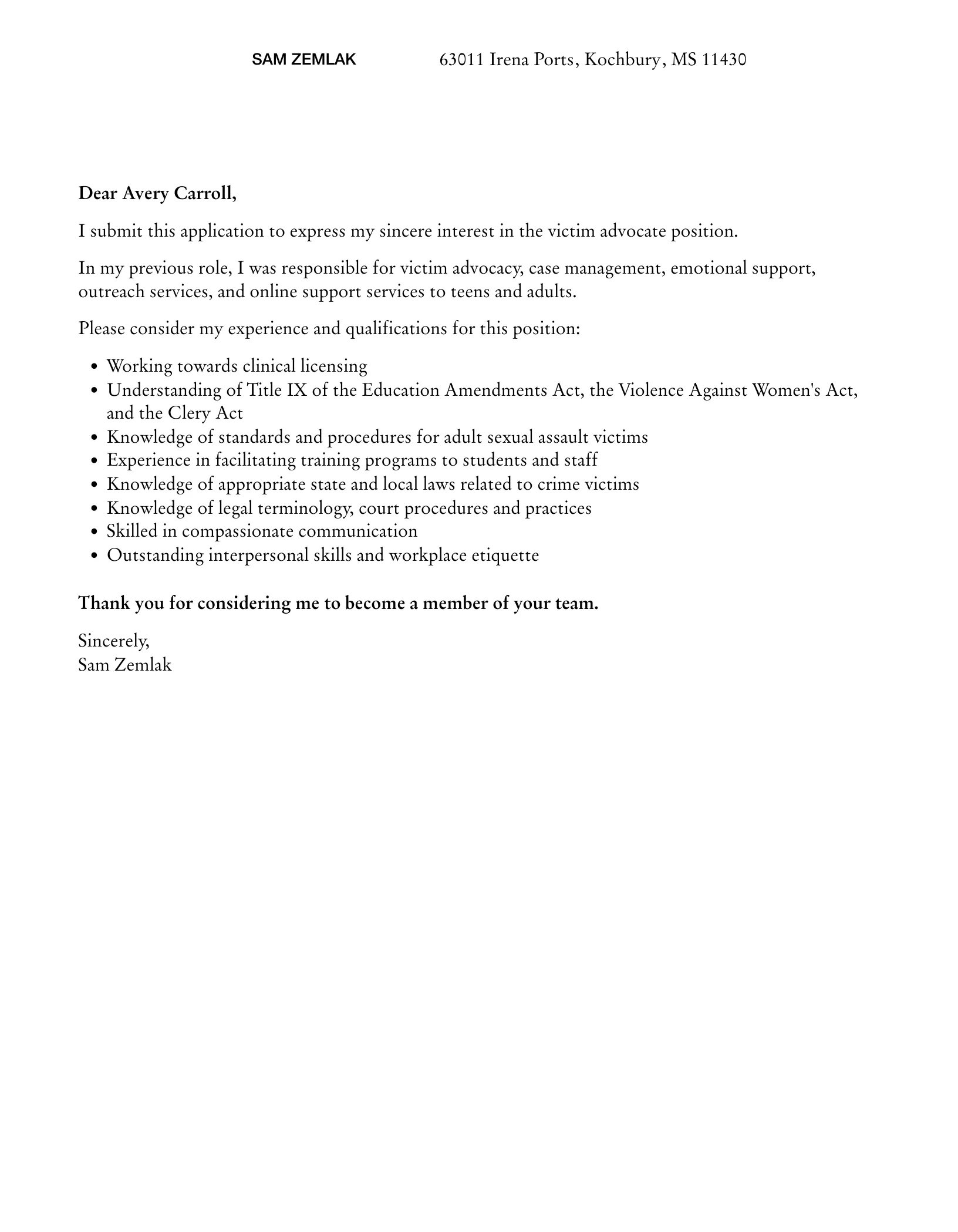
It’s important to address the lack of experience head-on. Acknowledge your lack of direct experience, but don’t let it define your application. Instead, frame it as an opportunity to highlight your eagerness to learn and your commitment to the field. Focus on your transferable skills and how you plan to apply them in the role. Express your willingness to undergo training and learn from experienced professionals. Discuss any research you’ve done about the organization and the services they provide. Convey your enthusiasm for the role and your dedication to making a positive impact. Your focus should be on what you can bring to the position, such as your transferable skills, passion, and willingness to learn.
Highlighting Volunteer Work and Community Involvement
Volunteer work and community involvement can be invaluable in demonstrating your commitment to helping others and developing relevant skills. If you’ve volunteered with any organizations that assist victims, describe your role, the tasks you performed, and the impact you made. If you’ve volunteered with crisis hotlines, shelters, or social service agencies, this is an excellent example of directly transferable experience. Even if your volunteer work wasn’t directly related to victim support, highlight any experiences that showcase your empathy, communication skills, or ability to work with vulnerable populations. Any community involvement, such as participating in advocacy groups or awareness campaigns, can demonstrate your commitment to helping others and your interest in the field.
Finding Volunteer Opportunities
If you’re looking to gain experience, explore volunteer opportunities at local shelters, victim services organizations, or crisis hotlines. Reach out to non-profit organizations and inquire about volunteer positions. Many organizations welcome volunteers and provide training to help them succeed. You can search online for volunteer opportunities in your area or explore opportunities with national organizations. When you volunteer, actively seek opportunities to interact with clients, provide support, and learn about the challenges they face. Be proactive in seeking training, shadowing experienced advocates, and expanding your knowledge of victim support. Consider taking on additional responsibilities to gain more experience and demonstrate your commitment to the organization.
Showcasing Your Impact
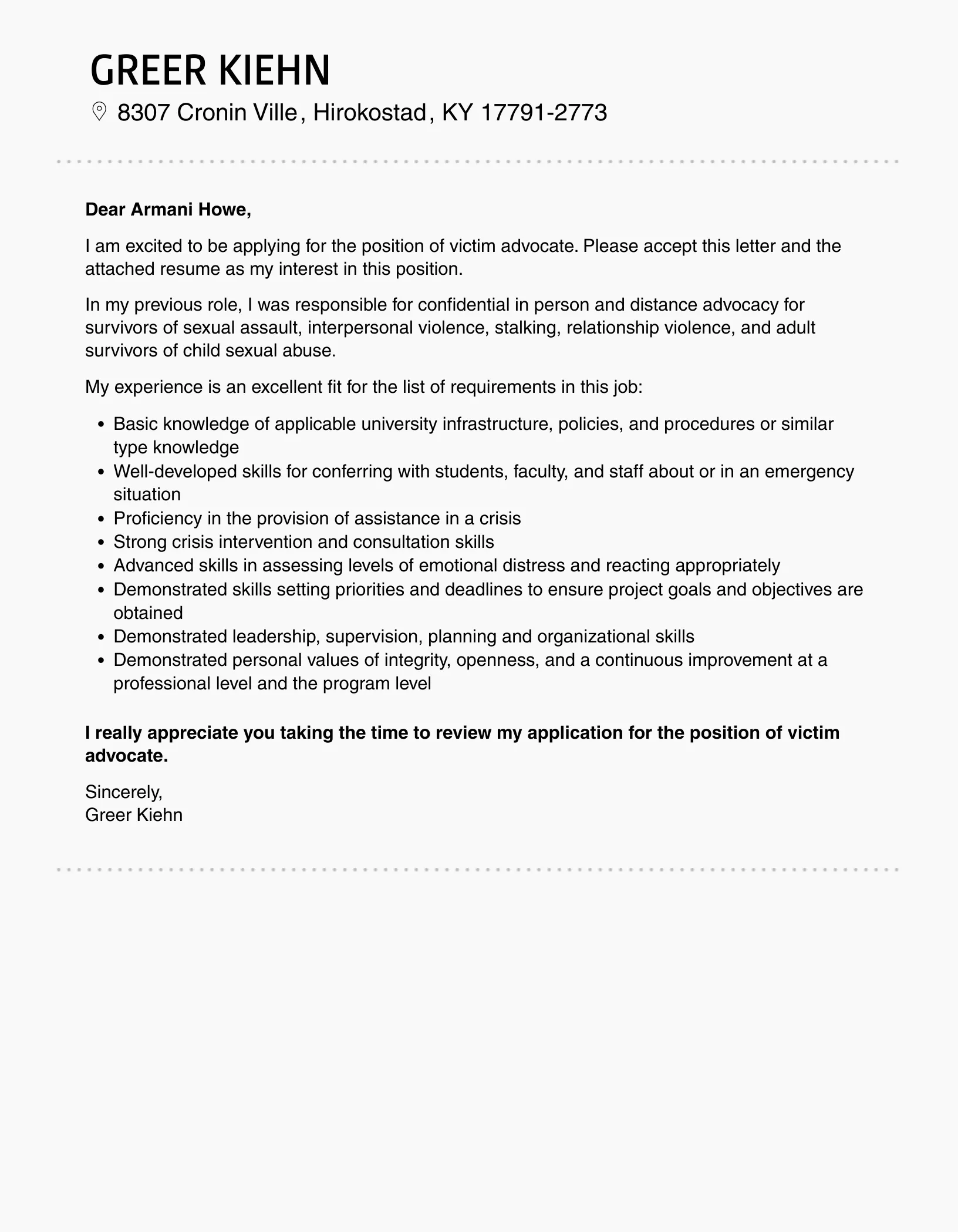
When describing your volunteer work, focus on the impact you made. Quantify your accomplishments whenever possible. For instance, if you helped answer hotline calls, provide the number of calls handled or any positive feedback you received. If you assisted with fundraising, mention the amount of money raised or any successful events you helped organize. When discussing any community work, describe the reach of your activities and the positive outcomes. Highlight any skills you developed, such as communication, empathy, active listening, or problem-solving, and how these skills benefited the victims you supported. Your goal is to show the employer that you are capable and dedicated, and that you would be an asset to their team. Emphasize the positive contributions you have made to people’s lives.
Proofreading and Polishing Your Cover Letter
A polished and well-written cover letter is crucial for making a positive impression. Your letter is a reflection of your professionalism, and any errors can undermine your credibility. Therefore, it is essential to proofread your letter carefully for any errors in grammar, spelling, and punctuation. Take your time and read through your letter several times, or use a spell-checker and grammar tool. Consider having a friend or family member review your letter for clarity and accuracy. Ensure that your writing is clear, concise, and easy to understand. Make sure your formatting is consistent and your letter is visually appealing. Your cover letter should present you as a detail-oriented and capable candidate.
Avoiding Common Mistakes
Common mistakes can easily detract from your application. Ensure that your cover letter is free of any typos, grammatical errors, or formatting inconsistencies. Avoid using generic templates or cookie-cutter phrases that don’t specifically apply to the job. Be specific about the position and organization you are applying to. Also, avoid being overly wordy or using jargon that the hiring manager may not understand. Do not use negative language or focus too much on your lack of experience. Instead, maintain a positive and confident tone throughout your letter. Never include any information that is not true. These simple steps can help create a great first impression.
Seeking Feedback
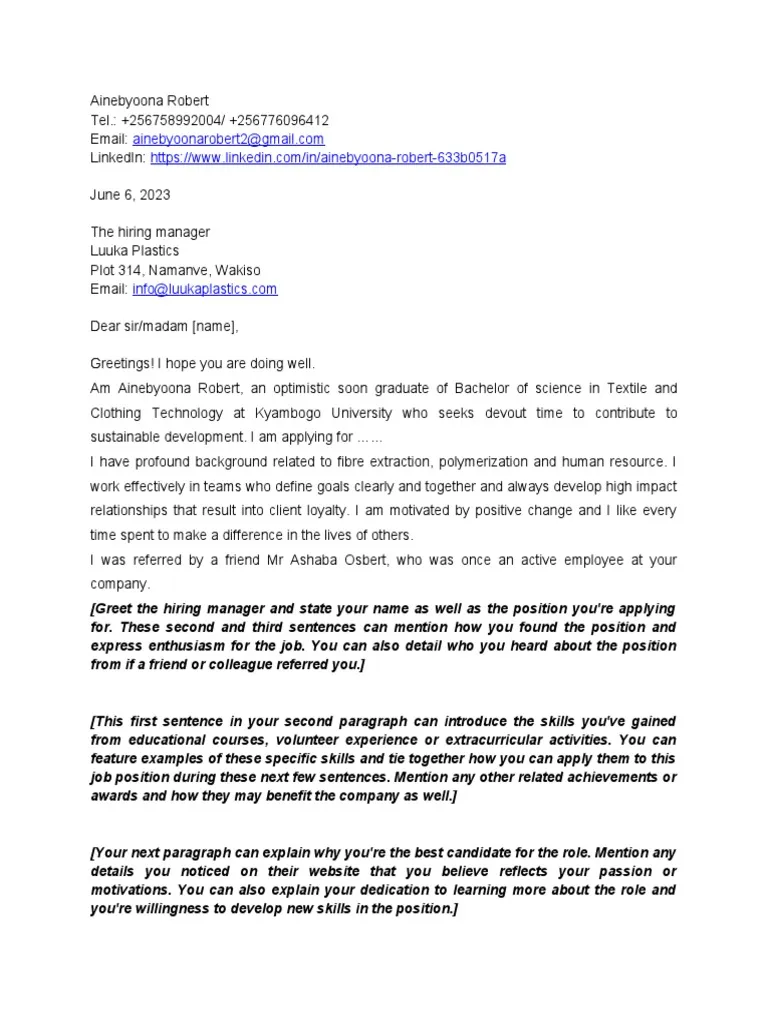
Get feedback on your cover letter from multiple sources. Ask friends, family, career counselors, or mentors to review your letter. Provide them with the job description and ask them to assess whether your letter effectively highlights your skills and qualifications. Be open to constructive criticism, and use the feedback to refine your letter. Consider using online resources to learn more about cover letter writing or to get feedback on your draft. Many websites offer templates and examples to help you get started. You can also use online grammar and spell-checking tools to ensure your letter is error-free. Be sure to revise and proofread your cover letter before submitting it to the employer. By putting in the extra effort, you can create a compelling cover letter that will help you get the job.
